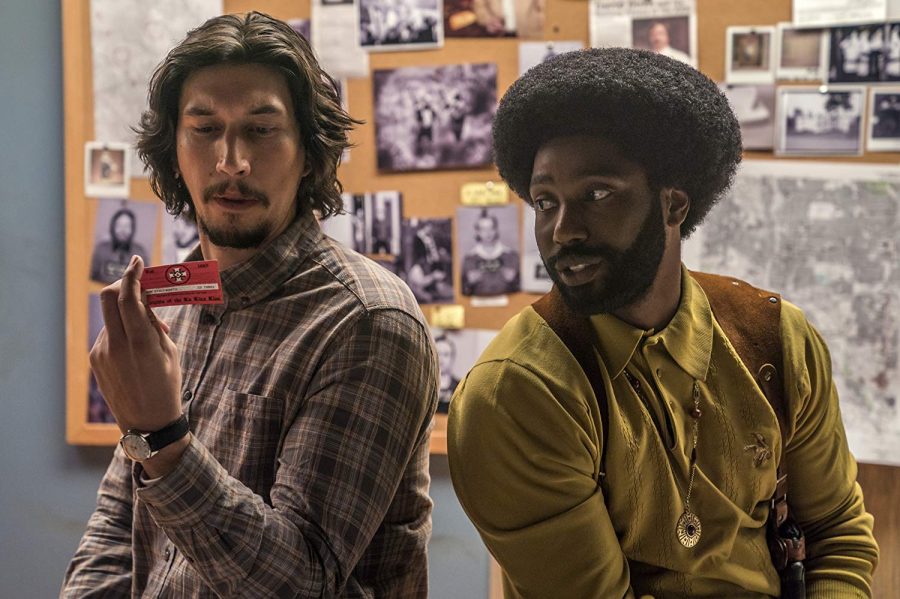‘BlacKkKlansman’ a honest and terrifying look at civil rights
John David Washington and Adam Driver in BlacKkKlansman (2018)
In 1978 Ron Stallworth, the first black police officer in Colorado Springs history, convinced a member of the Ku Klux Klan that he was a white supremacist. “BlacKkKlansman,” a film that’s almost to wild to be true, recreates the fascinating and often terrifying ride of Officer Stallworth and his journey into white supremacy. “BlacKkKlansman” was nominated for six Academy Awards and director Spike Lee took home the Oscar for Best Adapted Screenplay.
It all starts when rookie police officer Ron Stallworth (played in the film by John David Washington) becomes tired of the normal cop beat. After being assigned to the detective division, Stallworth begins making contact with the local chapter of the Klan by calling a number posted in the Colorado Springs paper. He uses a “white voice” to trick the supremacist into believing his story and before he knows it, Ron is in.
With the help from seasoned detectives Jimmy Creek (Michael Buscemi) and Jewish officer Flip Zimmerman (Adam Driver) pretending to by Ron during face-to-face meetings, the dangerous sting operation begins to take shape. Tensions rise as Grand Wizard David Duke enters the picture and Stallworth’s true identity is nearly uncovered constantly, with Klan “brothers” becoming increasingly suspicious. This eye-opening drama scares and enlightens audiences about the dangers lurking in the peaceful communities of America not only in the past but in the modern world of today.
“BlacKkKlansman” is a thrilling film to watch, and is deserving of its Oscar nomination for Best Picture. Lee refuses to sugarcoat the hard truths about bigotry and painful racial slurs are tossed about relentlessly, their sting never fading as the movie progresses. In an explosive ending (literally) there’s almost a sigh of relief that the horrors are finally over until Lee smugly reminds his audience that these attitudes are still ever-present today.
One of the highlights of this film is the great way that the actors work together. Driver and Washington pair well together and their personalities complement each other nicely. Driver’s performance especially stands out as he depicts the turmoil that a Jewish officer has to face as he rises in stature among his new Klan “buddies” and is forced to pretend to turn his back on his heritage while spouting off hate-speech and planning attacks with the other Klan members.
Despite the critical praise, this movie isn’t without its faults, however, and pacing is a huge issue for “BlacKkKlansman.” It seems to build up to something really big or insightful, but in its two hours and fifteen minutes, the ending just drops off, wrapped up too quickly without a second thought or satisfying conclusion. This is discouraging especially because the film has so much going for it, but while it’s a wonderful movie to watch, this quality doesn’t make it especially re-watchable.
It seems that there’s a troika of acclaimed civil rights films this year with “Green Book,” “If Beale Street Could Talk,” and “BlacKkKlansman.” “Beale Street” is thoughtful and lyrical, flitting across the screen like a dream, but it still speaks volumes about the disparity of civil rights in this country. “Green Book” has often been criticized for being too simplistic, smoothing over the true ugly history of Jim Crows for something that’s easier to swallow for a popular audience.
“BlackKklansman,” however, seems to be the strongest of the three; not afraid to be honest or to offend. It tells a true story unflinchingly and doesn’t allow the credits to roll before it pulls the audience into modern times, pointing to incidents like the Charlottesville car attack in 2017 or highlighting the chilling similarities between the actions and chants of the film’s antagonists with white supremacy marches in the past year. It’s a hard-hitting, no holding punches movie that will make you want to make a change right now.
So even though it came out in August, and even though it didn’t take home that shiny gold trophy for Best Picture, “BlacKkKlansman” is still a must-see. Its dark humor will keep you afloat despite its barrage of painful images and its story is a reminder of what it looks like when great, honest filmmaking is allowed to shine.

Brian is a junior Biology and Psychology major that loves to watch and talk about movies and tv shows. He writes movie reviews for The Wichitan and is...



